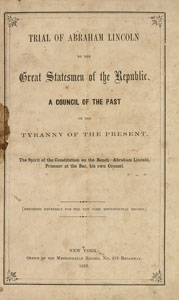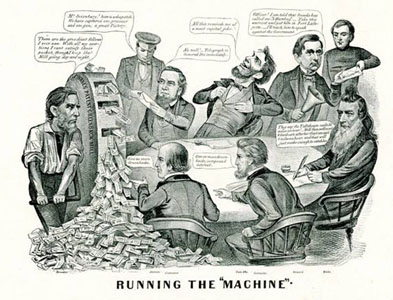
Lincoln and his Detractors

During his presidency Abraham Lincoln had to withstand scathing attacks from the political and ideological enemies. He was not only pilloried in the southern press but also had northern detractors. One such northerner was John Mullaly (1835–1915), editor of the New York-based Metropolitan Record and an opponent to the war, who wrote and published the Trial of Abraham Lincoln by the Great Statesmen of the Republic (New York: Office of the Metropolitan Record, 1863). In this publication Mullaly created a kind of play in which earlier heroes of the United States criticized Lincoln and his policies, especially his assumption of war-time powers. In one instance, the U.S. Constitution testifies against Lincoln, saying: “He has quartered large bodies of armed troops among us. He has deprived us, in many cases, of the benefits of trial by jury. He has taken away our charters, abolished our most valuable laws, and altered, fundamentally, the powers of our government. He has suspended our own legislatures. He has abdicated government here, by declaring us out of his protection, and waging war against us. He has ravaged our coasts, burnt our towns and destroyed the lives of our people. He has incited domestic insurrections against us, and has endeavored to bring on the inhabitants of our frontiers the merciless Indian [Negro] savages, whose known rule of warfare is an undisputed destruction of all ages, sexes, and conditions.” In 1864, Mullaly fell afoul of war-time powers to suppress sedition, and was arrested for urging resistance to the Union draft.

“Running the Machine”
This Currier and Ives print from 1864 (left) poked fun at the Lincoln cabinet. It was based in part on a letter that Secretary of War Edwin M. Stanton wrote to former president James Buchanan just after the Battle of Bull Run, in which he gave a scathing criticism of the Lincoln administration as inept at “running the machine” of government. Here members of the cabinet are shown abusing the sedition act to imprison enemies or issuing ridiculous orders for prosecuting the war. Meanwhile, contractors urge the government to bring them more profit. The text in the bubbles reads as follows:
Telegram Deliveryman: “Mr. Secretary, here is a dispatch. We have captured one prisoner and one gun. A great victory!”
Secretary of State Edwin M. Stanton: “Ah well! Telegraph to General Dix immediately.”
Secretary of the Navy Gideon Welles: “They say the Tallahassee sails 24 miles an hour! Well then, we’ll send 4 gunboats after her that can sail 6 miles an hour, and that will just make enough to catch her.”
William Pitt Fessenden, Secretary of the Treasury, turning the money mill: “These are the greediest fellows I ever saw. With all my exertions I can’t satisfy their pocket, though I keep the Mill going day and night.”
Government Contractors (bottom): “Give us more Greenbacks. Give us more Greenbacks, compound interest.”
Secretary of State William H. Seward: “Officer! I am told that Snooks has called me a Humbug. Take this warrant and put him in Fort Lafayette. I’ll teach him to speak against the Government.”
Abraham Lincoln: “All this reminds me of a most capital joke!”
Text by James Cusick and Matthew Yozgatlioglu
